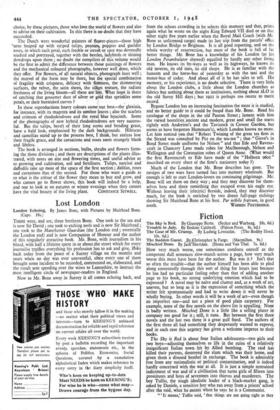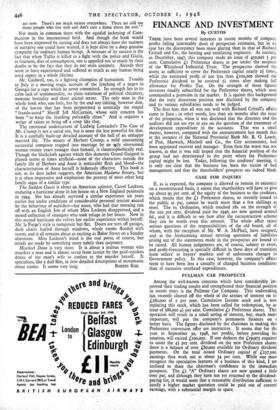Fiction
The Case of Mr. Crump. By Ludwig Lewisohn. (The Bodley Head.
10s. 6d.) How very much worse, one sometimes comforts oneself as the competent dull sentences slow-march across a page, how very much worse this must have been for the author. But was it ? Isn't that so often the trouble—that the author himself has been able to plod along contentedly through this sort of thing for hours just because he has had no particular feeling other than that of adding another page to his book, no strong underlying emotion which had to be expressed ? A novel may be naive and clumsy and, as a work of art, uneven, but so long as it is the expression of something which the writer felt spontaneously and had to write down it will never be wholly boring. In other words it will be a work of art—even though an imperfect one—and not a piece of good plain carpentry. For example, none of the five novels on the above list is appalling. None is badly written. Mischief Done is a little like a selling plater in company too good for itstill, it runs. But between the first three novels and the last two there is a great gulf fixed. The authors of the first three all had something they desperately wanted to express, and in each case this urgency has given a welcome impetus to their books.
The Sky is Red is about four Italian adolescents—two girls and two boys—adjusting themselves to life in the ruins of a relatively insignificant Italian town hit by Allied bombing. The raid has killed their parents, destroyed the slum which was their home, and given them a disused brothel in exchange. The book is admirably free from any nationalistic or political contamination, and is indeed hardly concerned with the war at all. It is just a simple restrained indictment of war and of a civilisation that turns girls of fifteen into prostitutes and boys of seventeen into thieves and murderers. The boy Tullio, the tough idealistic leader of a black-market gang, is asked by Daniele, a sensitive boy who ran away from a priests' school after the raid, what he means when he says he is a Communist.
" It means,' Tullio said, ' that things are not going right as they are now. There's too much misery everywhere. There are still too many people who live well and don't care a damn about the rest.' " Not much in common there with the squalid jockeying of Com- munism in the international field. And though the book would have been improved by cutting and does not always have the tautness of narrative one could have wished, it is kept alive by a deep genuine sympathy for ordinary human beings. A measure of its success is the fact that when Tullio is killed in a fight with the police and Giulia, at fourteen, dies of consumption, one is appalled not so much by their deaths as by the fact that they do not seem untimely. Already they seem to have experienced and suffered as much as any human being need expect in a whole lifetime.
Mr. Caldwell, too, is a fighting champion of humanism. Trouble in luly is a moving tragic account of the lynching of a negro in
Georgia for a rape which he never committed. Its strength lies in its calm lack of sentimentality, its plain statement of political chicanery, moronic bestiality and sheer animal terror. The only man in the whole book who, one feels, has by the end any inkling, however dim, of the horror that has been perpetrated is ironically the stupid " frazzle-assed " Sheriff Jeff McCurtain, whose only concern has been " to keep the lynching politically clean." And it requires a writer of talent to bring off a coup like that.
The emotional undercurrent of Ludwig Lewisolin's The Case of Mr. Crump is not a social one, but is none the less powerful for that.
It is a carefully built-up detailed account of the hell of an unhappy married life. The misery of Herbert Crump, a mild unassuming successful composer trapped into marriage by an ti ly obsessional woman twenty years younger than himself, is claustrophobically real.
Though the blackcloth against which this domestic Grand Guignol is played seems at• times artificial—none of the characters outside the
family life of Herbert and Anne is noticeably flesh and blood—the characterisation of Anne herself is hideously effective. This book is not, as its dust jacket suggests, the American Madame Bovary, but it is often impressive and emphasises the poverty of most other long family sagas of a similar type. The Sudden Guest is about an American spinster, Carrel Leckton, enduring a hurricane alone in her house on a New England peninsula in 1944. She has already survived a similar experience six years
earlier but under conditions of considerable personal tension eaused by the behaviour of outsiders—her niece, who had that morning run off with an English Jew of whom Miss Leckton disapproved, and a mixed collection of strangers who took refuge in her house. Now in this second hurricane she relives her earlier experience within herself. Mr. la Farge's style is competent but flat. Doors are torn off garages deck chairs hurled through windows, whole rooms flooded with storm, and it all remains about as exciting as Baker Street on a Sunday afternoon. Miss Leckton's mind is the real point, of course, but minds are made by something more subtle than carpentry.
Mischief Done is very short. It is about a jealous woman who murders a man and is almost saved from justice by the grief-stricken
desire of the man's wife to confess to the murder herself. It specialises, like a dull film, in slow detailed descriptions of movements
about rooms. It seems very long. ROBERT KEE.



































 Previous page
Previous page